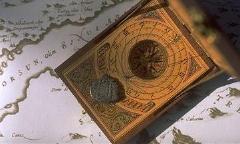This research project dealt with the dissemination of knowledge in the sequel of that of power and belief structures on the Eurasian continent. The focus here was on processes in which knowledge spreads across long distances or over vast areas as an incidental effect of other diffusion processes such as the expansion of empires or the spread of religions. These processes may be of transregional and cross-cultural character, but they may also be corridor-like, connecting distant regions by a thin and fragile chain of transmission, for instance, a trade route like the Silk Road or the Jesuit mission to China. As knowledge is but a fellow traveler in these processes, the results of transmission are often only of a transitory nature but have the possibility of the long-lasting sedimentation of at least some achievements, such as practices of writing and calculating that later became relevant to the appropriation of scientific knowledge. This kind of knowledge globalization began with the emergence of institutions bundling cultural activities such as centers of trade and production, states and world religions. As a consequence, transmission processes themselves became institutionalized. Commercial, military and missionary activities provided new stimuli for knowledge transmission.
Within this focus the kinds of knowledge are communicated during the spread of Buddhism in the first millennium AD were investigated as well as the transformative processes involved (Jens Braarvig). An outcome is that the adoption of Buddhism had a great impact on some of the receiving societies. It created not only new knowledge and religious activities, but also important institutions, such as the monastic community, and stimulated further intellectual and educational activities in fields such as grammar, lexicography, logic, philosophy and psychology.
One investigation addressed the transmission by Jesuit missionaries of European scientific knowledge to China in the early modern period (Matthias Schemmel). It was confirmed that this transmission led to a partial integration of European knowledge into the Chinese tradition without however bringing about the revolutionary developmental dynamics European scientific knowledge experienced at the same time in its culture of origin.
A complementary research endeavor dealt with educational journeys in Europe and Asia in early modern times taking the example of the travel diaries of the polyhistor Martinus Fogelius Hamburgensis (1634–1675), a correspondence partner of Gottfried Wilhelm Leibniz (Simone Rieger). In preparation for the reconstruction of a worldwide network in the early modern period, 1500 pages of Fogel’s travel diaries have been digitized in cooperation with the Gottfried Wilhelm Leibniz-Bibliothek Hannover and will be made available via the ECHO environment.
Research concerned with the spread of early modern science in Europe has shown that the spread of advanced knowledge from the centers to lessdeveloped scholarly traditions at the European periphery was not a simple transfer (Kostas Gavroglu, Manolis Patiniotis). By exploring the case of the establishment of Newtonian science in the Greek-speaking regions of the Ottoman Empire it has been shown that new ideas introduced to the so-called periphery were not placed in a void; they rather interacted with and displaced other, usually strongly entrenched systems of knowledge closely associated with religion.
Research on folk religion in South-Eastern Europe provided further insights into the socio-cultural background of knowledge diffusion at the turn of the 20th century (Florentina Geller). A further study of transmission from the center to the so-called periphery concerns the spread of French models of textbooks on mathematics to Spain in the 19th century (José M. Pacheco).
The production and dissemination of scientific knowledge as a fellow traveler of colonization, can, by active accommodation to new circumstances, become a powerful motor of decolonization, as the example of 20th-century India illustrates (Dhruv Raina). The transmission of new technological and scientific knowledge under the conditions of external pressure often provoked an immune response mobilizing or newly inventing local knowledge traditions. In India such a mobilization led, for instance, to attempts to revive and reinterpret traditional Ayurvedic medicine in terms of Western medical and pharmaceutical knowledge.

